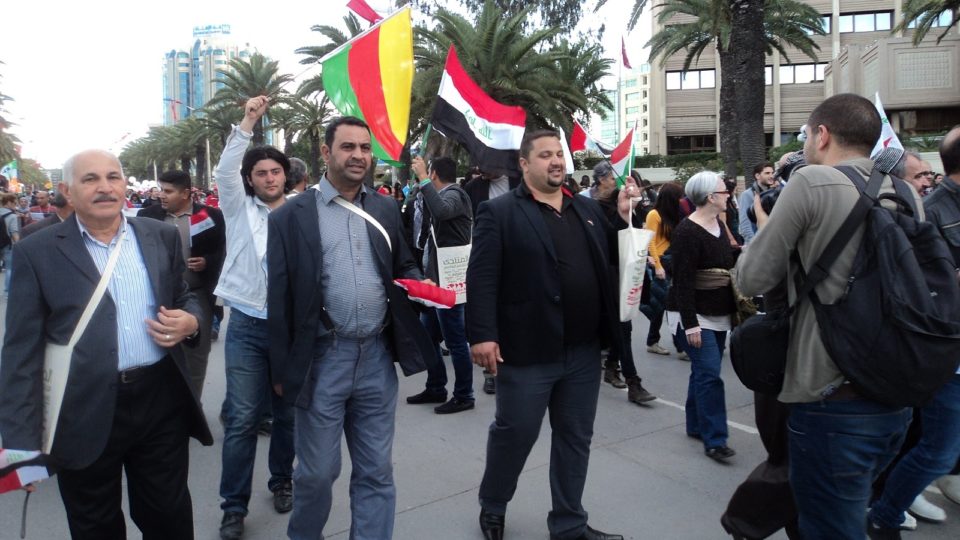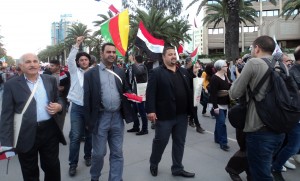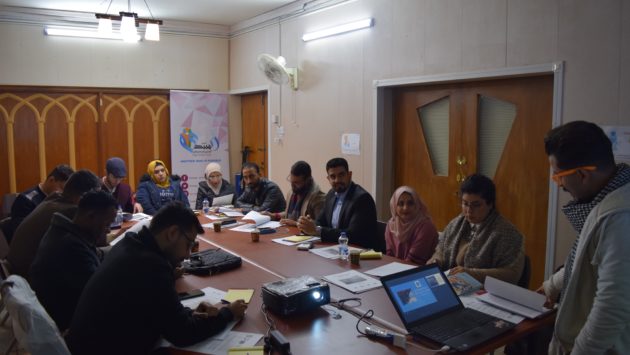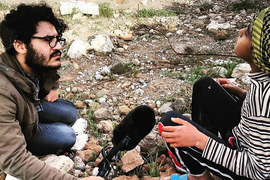Iraqi Minorities, A Spring Experience In Crisis
Hussam Abdullah Ali
A paper submitted by the Azidi Solidarity and Fraternity League, part of the contribution of the Iraqi delegation to the World Social Forum – Tunisia – 26-30 – March 2013
The political, economic and social crises in Iraq still go on ,as well the suffering of Iraqi minorities !
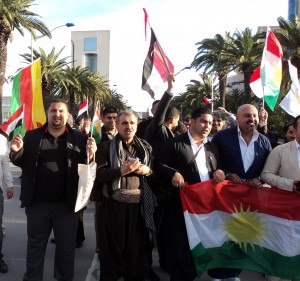
Minorities in Iraq hoped to have a better life after 2003 even if the change in Iraq was created by war and foreign occupation. They expected to be able to overcome the impact of another war and to live in more stable and democratic Iraq but they soon clashed with the new reality.
Minorities in Iraq suffered under the previous regimes suffering after another, because they were authoritarian regimes that never provide formal or constitutional recognition of those minorities and their presence in Iraq. Minorities rights were never respected even if Iraq is one of the first countries that joined many Human rights conventions including the International Covenant on Civil and Political Rights, issued in 1966.
Before the official and popular referendum on the new constitution in Iraq in 2005, many forces in the civic movements started to be active in the defense of the minorities rights. Many activities were organized: events and lobbying campaigns for the inclusion of minorities and ensure their rights in the new constitution,. civil society movements succeeded in the inclusion of rights of religious and ethnic minorities in the new constitution, Today Iraqi constitution included more than 7 articles provided cultural and political rights for the Iraqi minorities .
After the constitution has been passed and the political process began to take its dimensions in stability, a wave of bloody violence and the blind terror start to burn everything , everybody, and every zone. All iraqi suffered of this blind terror with tens if not hundreds of thousands of deaths and injuries and destruction of infrastructures.But minorities and because they are minorities in terms of the number and presence had the greatest bad impact of the bloody violence.As a result the migration of minorities increased very fast , also because of the cutoff of their livelihood means and sources, since they have been targeted in their homes, shops and their working areas.
Despite the appeals of persistent of the international organizations and the United Nations and friendly international community , but the serial killings and targeting toward minorities remained constant.
The political and governing crisis in Iraq , the lack of real participation , lack of confidence between the political forces and the shed of the parties in power, all of this contributed to keep minorities out of the real participation in governance.The weakness of the state power to lay stabilize the role of law and law enforcement, kept minorities to be continuously targeted by armed groups as well as the oppression of the big parties and the dominant political forces.
Most of the iraqi minorities that live at the “border” area between the central state and the Kurdistan federal region of Iraq, feel that they are seen as a “political card” that can be manipulated in the conflict between the KRG region and the central government a large amount of the violence in these areas is because of this fact.
The “quota” system which is the system of allocating specific seats to the minorities , have encouraged and played a prominent role in ensuring minority representation in legislative institutions including parliament and provincial councils. this “quota” system was never bad, acutely it helped and contributed in the representation of minorities and their presence in institutions. however same system has been politically used and the manipulation of the representation proportions began to be not in line with the population ratio of those minorities, also the large dominance of the parties has made quota a disabled system.
Minorities and their role in social mobility and the Iraqi Social Forum
Iraqi social movements have always brought to the attention the issue of minorities. During the Tunisian world Social Forum, there was presentation of this paper as part of the Iraqi Civil Society Solidarity initiative (ICSSI) session. The discussion have brought to the attention the important role that the minorities will play in the coming Iraqi social forum.
to be mentioned also the role of LaOnf the Iraqi group of non-violence and the international partners in campaigning of minorities rights . all these efforts are considered as a victory for those social movements.
Some Recommendations To The World Social Forum In Tunisia:
1- Adopt the issue of minorities in the upcoming social forums and work to develop strategies and campaigns to advocate the cause of Iraqi minorities, as well as minorities in the countries of the Arabic Spring.
2- Ensure the constitutional and legal rights of minorities and ensure the active and practical application of those rights which are mentioned in the constitutions and laws, whether in Iraq or in the countries of the Arabic Spring.
3- Encourage the governments of the Arab countries and the countries where there are minorities to join the international treaties and conventions that guarantees the rights of minorities and work on the actual compliance of those rights.
4- The rights of minorities is a cultural and social issue and the social movements have to make a civic education and raise awareness of the culture and diversity of these minorities and work on the effective integration within the concept of “citizenship”.
5- Invite the international partners to work on the support of civil society in the quest to raise awareness of the rights of minorities and include them in international forums to make the issue of minorities to be heard internationally.

